Legal Skills 6: Education Act and its Societal Impact
VerifiedAdded on 2021/05/31
|9
|1418
|29
Essay
AI Summary
This essay examines the impact of the UK Education Act on the education system and society. It analyzes various sources to understand the legislation's influence on youth participation, skill development, and overall social and economic well-being. The essay discusses arguments for and against the act, considering its effects on compulsory education, freedom of choice, and the rights of young people. It explores the role of government intervention, the impact on disabled children, and the relationship between the act and career development. The analysis considers both the positive aspects, such as enhanced skill development and economic growth, and the negative arguments, including concerns about individual freedom and coercion. The essay draws upon multiple sources to provide a comprehensive overview of the Education Act's impact on the UK.

Running head: LEGAL SKILLS
LEGAL SKILLS
Name of the student
Name of the university
Author note
LEGAL SKILLS
Name of the student
Name of the university
Author note
Paraphrase This Document
Need a fresh take? Get an instant paraphrase of this document with our AI Paraphraser
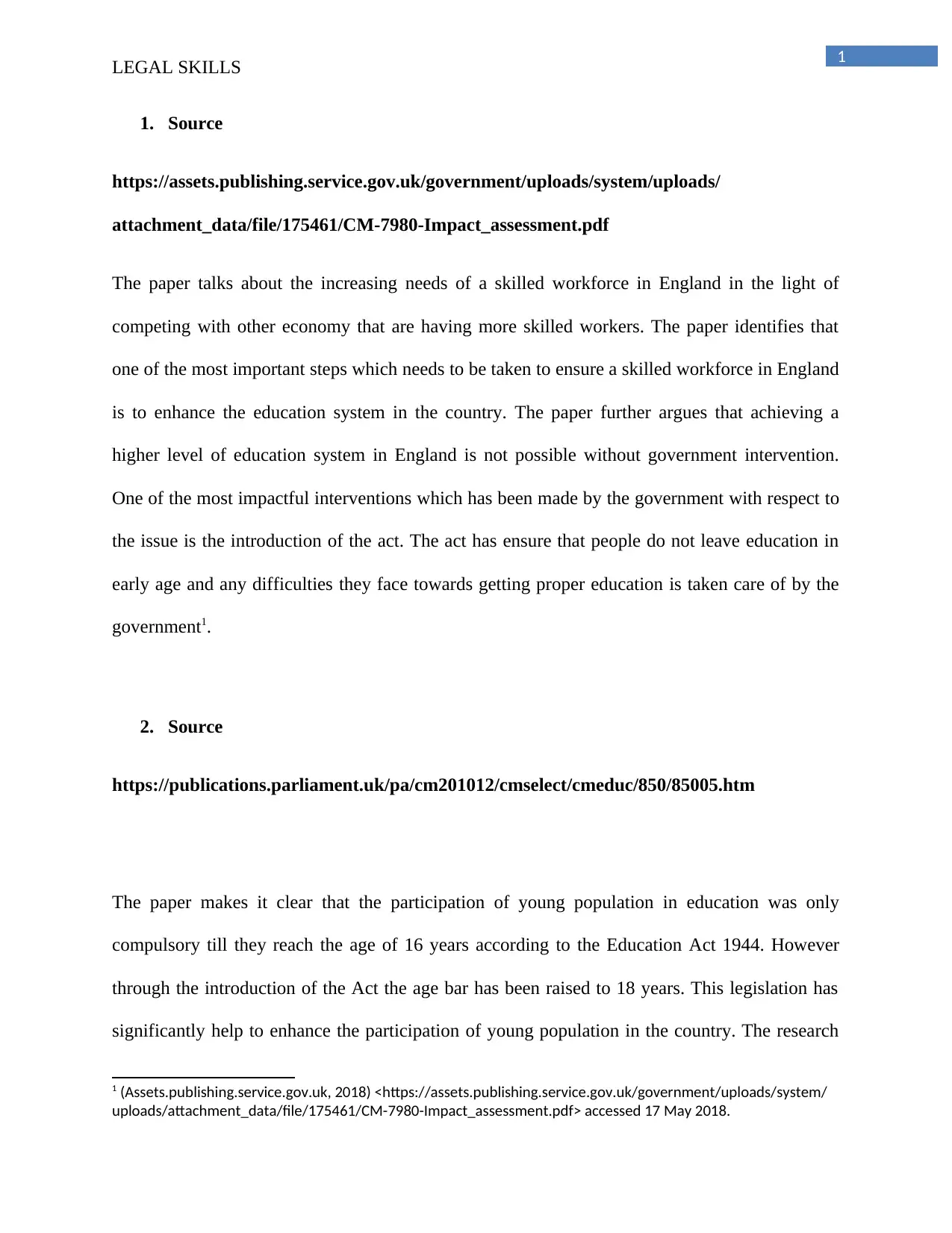
1
LEGAL SKILLS
1. Source
https://assets.publishing.service.gov.uk/government/uploads/system/uploads/
attachment_data/file/175461/CM-7980-Impact_assessment.pdf
The paper talks about the increasing needs of a skilled workforce in England in the light of
competing with other economy that are having more skilled workers. The paper identifies that
one of the most important steps which needs to be taken to ensure a skilled workforce in England
is to enhance the education system in the country. The paper further argues that achieving a
higher level of education system in England is not possible without government intervention.
One of the most impactful interventions which has been made by the government with respect to
the issue is the introduction of the act. The act has ensure that people do not leave education in
early age and any difficulties they face towards getting proper education is taken care of by the
government1.
2. Source
https://publications.parliament.uk/pa/cm201012/cmselect/cmeduc/850/85005.htm
The paper makes it clear that the participation of young population in education was only
compulsory till they reach the age of 16 years according to the Education Act 1944. However
through the introduction of the Act the age bar has been raised to 18 years. This legislation has
significantly help to enhance the participation of young population in the country. The research
1 (Assets.publishing.service.gov.uk, 2018) <https://assets.publishing.service.gov.uk/government/uploads/system/
uploads/attachment_data/file/175461/CM-7980-Impact_assessment.pdf> accessed 17 May 2018.
LEGAL SKILLS
1. Source
https://assets.publishing.service.gov.uk/government/uploads/system/uploads/
attachment_data/file/175461/CM-7980-Impact_assessment.pdf
The paper talks about the increasing needs of a skilled workforce in England in the light of
competing with other economy that are having more skilled workers. The paper identifies that
one of the most important steps which needs to be taken to ensure a skilled workforce in England
is to enhance the education system in the country. The paper further argues that achieving a
higher level of education system in England is not possible without government intervention.
One of the most impactful interventions which has been made by the government with respect to
the issue is the introduction of the act. The act has ensure that people do not leave education in
early age and any difficulties they face towards getting proper education is taken care of by the
government1.
2. Source
https://publications.parliament.uk/pa/cm201012/cmselect/cmeduc/850/85005.htm
The paper makes it clear that the participation of young population in education was only
compulsory till they reach the age of 16 years according to the Education Act 1944. However
through the introduction of the Act the age bar has been raised to 18 years. This legislation has
significantly help to enhance the participation of young population in the country. The research
1 (Assets.publishing.service.gov.uk, 2018) <https://assets.publishing.service.gov.uk/government/uploads/system/
uploads/attachment_data/file/175461/CM-7980-Impact_assessment.pdf> accessed 17 May 2018.
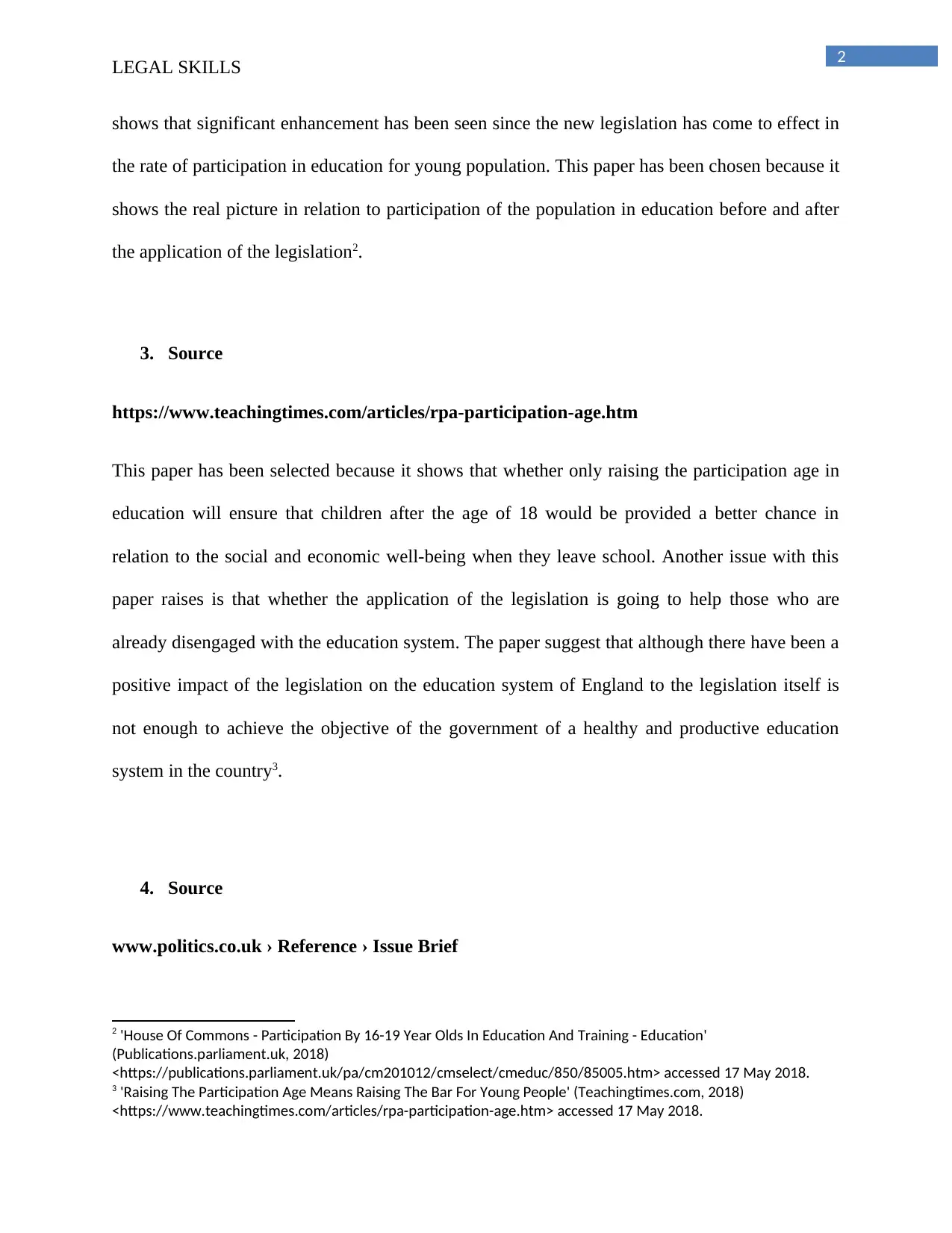
2
LEGAL SKILLS
shows that significant enhancement has been seen since the new legislation has come to effect in
the rate of participation in education for young population. This paper has been chosen because it
shows the real picture in relation to participation of the population in education before and after
the application of the legislation2.
3. Source
https://www.teachingtimes.com/articles/rpa-participation-age.htm
This paper has been selected because it shows that whether only raising the participation age in
education will ensure that children after the age of 18 would be provided a better chance in
relation to the social and economic well-being when they leave school. Another issue with this
paper raises is that whether the application of the legislation is going to help those who are
already disengaged with the education system. The paper suggest that although there have been a
positive impact of the legislation on the education system of England to the legislation itself is
not enough to achieve the objective of the government of a healthy and productive education
system in the country3.
4. Source
www.politics.co.uk › Reference › Issue Brief
2 'House Of Commons - Participation By 16-19 Year Olds In Education And Training - Education'
(Publications.parliament.uk, 2018)
<https://publications.parliament.uk/pa/cm201012/cmselect/cmeduc/850/85005.htm> accessed 17 May 2018.
3 'Raising The Participation Age Means Raising The Bar For Young People' (Teachingtimes.com, 2018)
<https://www.teachingtimes.com/articles/rpa-participation-age.htm> accessed 17 May 2018.
LEGAL SKILLS
shows that significant enhancement has been seen since the new legislation has come to effect in
the rate of participation in education for young population. This paper has been chosen because it
shows the real picture in relation to participation of the population in education before and after
the application of the legislation2.
3. Source
https://www.teachingtimes.com/articles/rpa-participation-age.htm
This paper has been selected because it shows that whether only raising the participation age in
education will ensure that children after the age of 18 would be provided a better chance in
relation to the social and economic well-being when they leave school. Another issue with this
paper raises is that whether the application of the legislation is going to help those who are
already disengaged with the education system. The paper suggest that although there have been a
positive impact of the legislation on the education system of England to the legislation itself is
not enough to achieve the objective of the government of a healthy and productive education
system in the country3.
4. Source
www.politics.co.uk › Reference › Issue Brief
2 'House Of Commons - Participation By 16-19 Year Olds In Education And Training - Education'
(Publications.parliament.uk, 2018)
<https://publications.parliament.uk/pa/cm201012/cmselect/cmeduc/850/85005.htm> accessed 17 May 2018.
3 'Raising The Participation Age Means Raising The Bar For Young People' (Teachingtimes.com, 2018)
<https://www.teachingtimes.com/articles/rpa-participation-age.htm> accessed 17 May 2018.
⊘ This is a preview!⊘
Do you want full access?
Subscribe today to unlock all pages.

Trusted by 1+ million students worldwide
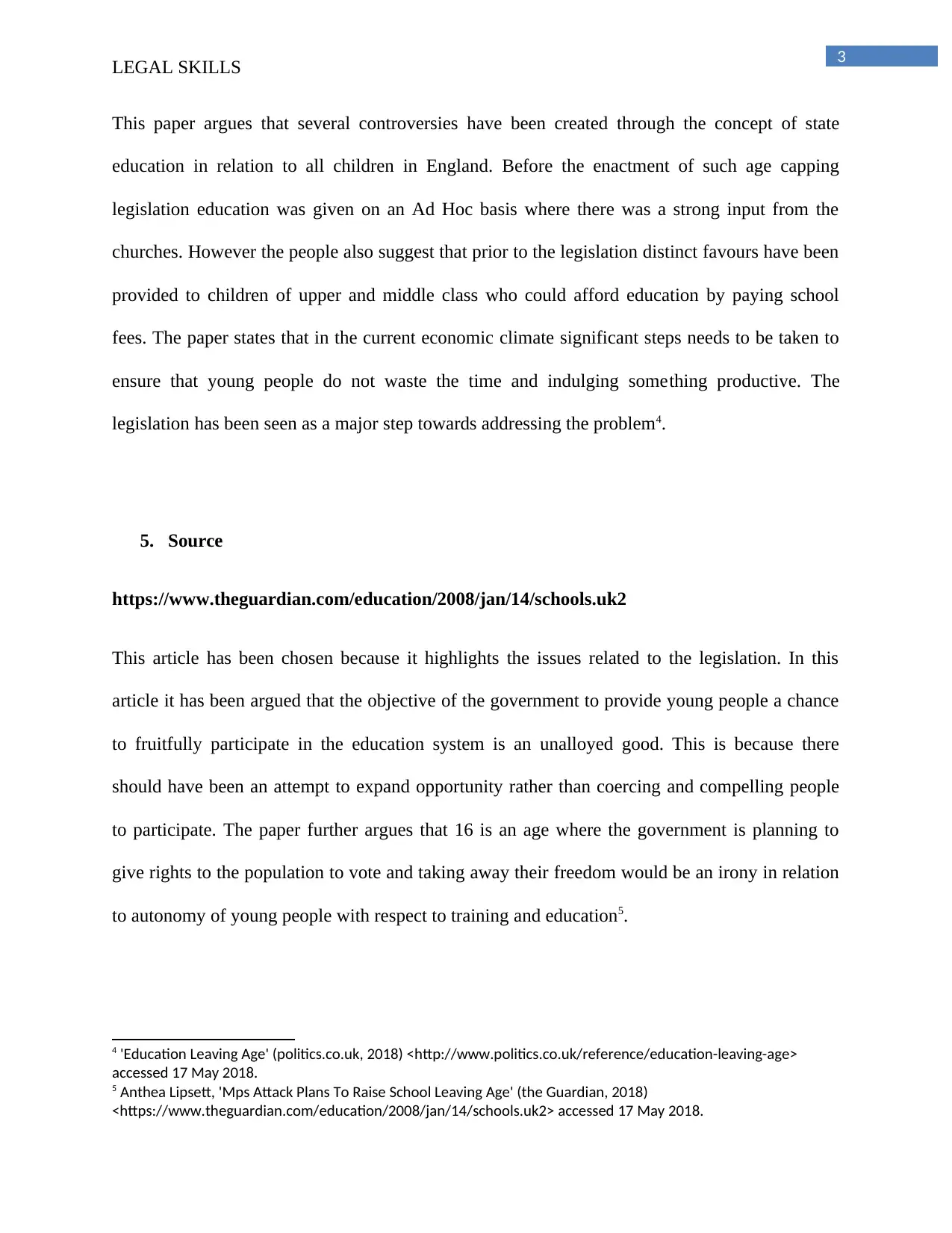
3
LEGAL SKILLS
This paper argues that several controversies have been created through the concept of state
education in relation to all children in England. Before the enactment of such age capping
legislation education was given on an Ad Hoc basis where there was a strong input from the
churches. However the people also suggest that prior to the legislation distinct favours have been
provided to children of upper and middle class who could afford education by paying school
fees. The paper states that in the current economic climate significant steps needs to be taken to
ensure that young people do not waste the time and indulging something productive. The
legislation has been seen as a major step towards addressing the problem4.
5. Source
https://www.theguardian.com/education/2008/jan/14/schools.uk2
This article has been chosen because it highlights the issues related to the legislation. In this
article it has been argued that the objective of the government to provide young people a chance
to fruitfully participate in the education system is an unalloyed good. This is because there
should have been an attempt to expand opportunity rather than coercing and compelling people
to participate. The paper further argues that 16 is an age where the government is planning to
give rights to the population to vote and taking away their freedom would be an irony in relation
to autonomy of young people with respect to training and education5.
4 'Education Leaving Age' (politics.co.uk, 2018) <http://www.politics.co.uk/reference/education-leaving-age>
accessed 17 May 2018.
5 Anthea Lipsett, 'Mps Attack Plans To Raise School Leaving Age' (the Guardian, 2018)
<https://www.theguardian.com/education/2008/jan/14/schools.uk2> accessed 17 May 2018.
LEGAL SKILLS
This paper argues that several controversies have been created through the concept of state
education in relation to all children in England. Before the enactment of such age capping
legislation education was given on an Ad Hoc basis where there was a strong input from the
churches. However the people also suggest that prior to the legislation distinct favours have been
provided to children of upper and middle class who could afford education by paying school
fees. The paper states that in the current economic climate significant steps needs to be taken to
ensure that young people do not waste the time and indulging something productive. The
legislation has been seen as a major step towards addressing the problem4.
5. Source
https://www.theguardian.com/education/2008/jan/14/schools.uk2
This article has been chosen because it highlights the issues related to the legislation. In this
article it has been argued that the objective of the government to provide young people a chance
to fruitfully participate in the education system is an unalloyed good. This is because there
should have been an attempt to expand opportunity rather than coercing and compelling people
to participate. The paper further argues that 16 is an age where the government is planning to
give rights to the population to vote and taking away their freedom would be an irony in relation
to autonomy of young people with respect to training and education5.
4 'Education Leaving Age' (politics.co.uk, 2018) <http://www.politics.co.uk/reference/education-leaving-age>
accessed 17 May 2018.
5 Anthea Lipsett, 'Mps Attack Plans To Raise School Leaving Age' (the Guardian, 2018)
<https://www.theguardian.com/education/2008/jan/14/schools.uk2> accessed 17 May 2018.
Paraphrase This Document
Need a fresh take? Get an instant paraphrase of this document with our AI Paraphraser
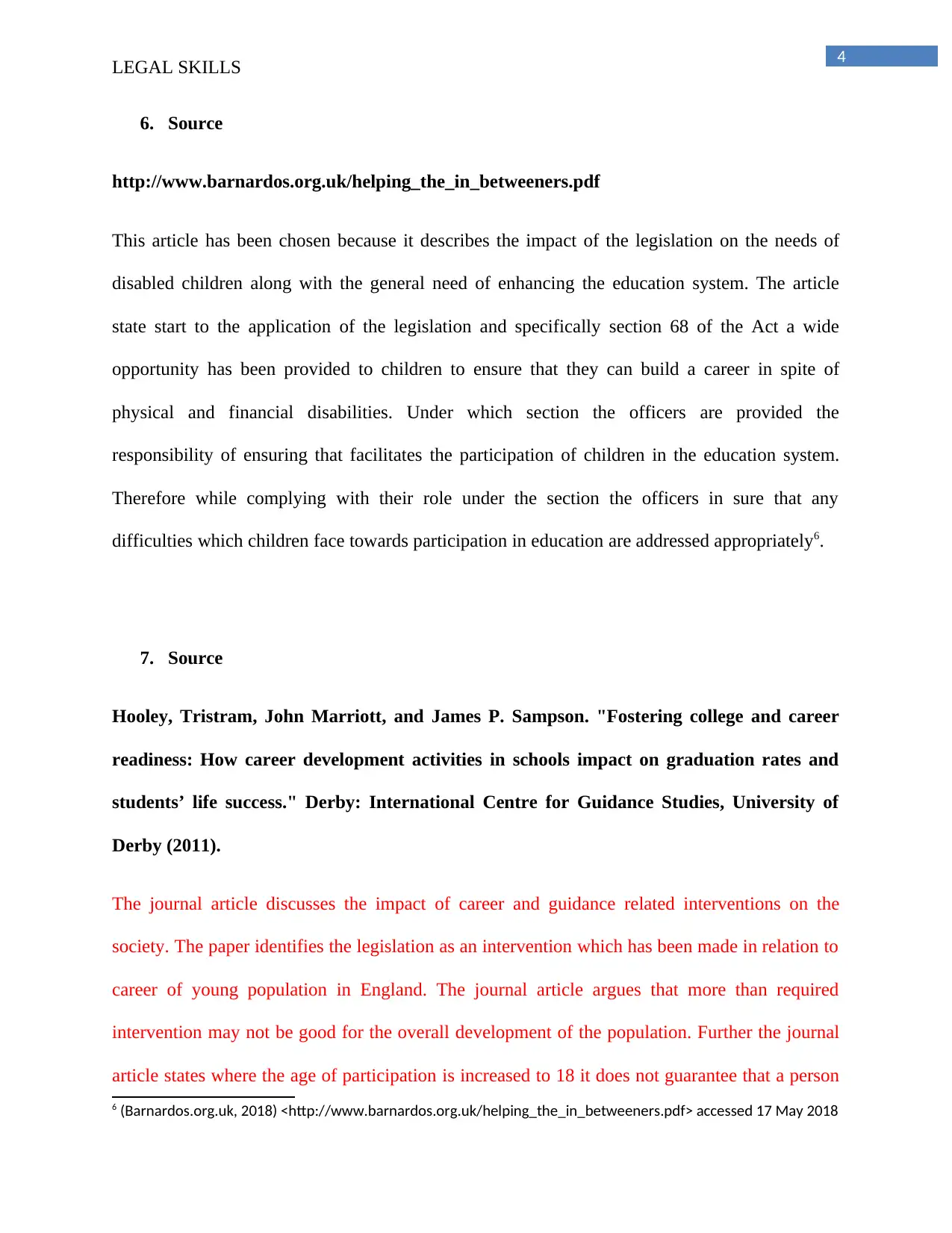
4
LEGAL SKILLS
6. Source
http://www.barnardos.org.uk/helping_the_in_betweeners.pdf
This article has been chosen because it describes the impact of the legislation on the needs of
disabled children along with the general need of enhancing the education system. The article
state start to the application of the legislation and specifically section 68 of the Act a wide
opportunity has been provided to children to ensure that they can build a career in spite of
physical and financial disabilities. Under which section the officers are provided the
responsibility of ensuring that facilitates the participation of children in the education system.
Therefore while complying with their role under the section the officers in sure that any
difficulties which children face towards participation in education are addressed appropriately6.
7. Source
Hooley, Tristram, John Marriott, and James P. Sampson. "Fostering college and career
readiness: How career development activities in schools impact on graduation rates and
students’ life success." Derby: International Centre for Guidance Studies, University of
Derby (2011).
The journal article discusses the impact of career and guidance related interventions on the
society. The paper identifies the legislation as an intervention which has been made in relation to
career of young population in England. The journal article argues that more than required
intervention may not be good for the overall development of the population. Further the journal
article states where the age of participation is increased to 18 it does not guarantee that a person
6 (Barnardos.org.uk, 2018) <http://www.barnardos.org.uk/helping_the_in_betweeners.pdf> accessed 17 May 2018
LEGAL SKILLS
6. Source
http://www.barnardos.org.uk/helping_the_in_betweeners.pdf
This article has been chosen because it describes the impact of the legislation on the needs of
disabled children along with the general need of enhancing the education system. The article
state start to the application of the legislation and specifically section 68 of the Act a wide
opportunity has been provided to children to ensure that they can build a career in spite of
physical and financial disabilities. Under which section the officers are provided the
responsibility of ensuring that facilitates the participation of children in the education system.
Therefore while complying with their role under the section the officers in sure that any
difficulties which children face towards participation in education are addressed appropriately6.
7. Source
Hooley, Tristram, John Marriott, and James P. Sampson. "Fostering college and career
readiness: How career development activities in schools impact on graduation rates and
students’ life success." Derby: International Centre for Guidance Studies, University of
Derby (2011).
The journal article discusses the impact of career and guidance related interventions on the
society. The paper identifies the legislation as an intervention which has been made in relation to
career of young population in England. The journal article argues that more than required
intervention may not be good for the overall development of the population. Further the journal
article states where the age of participation is increased to 18 it does not guarantee that a person
6 (Barnardos.org.uk, 2018) <http://www.barnardos.org.uk/helping_the_in_betweeners.pdf> accessed 17 May 2018
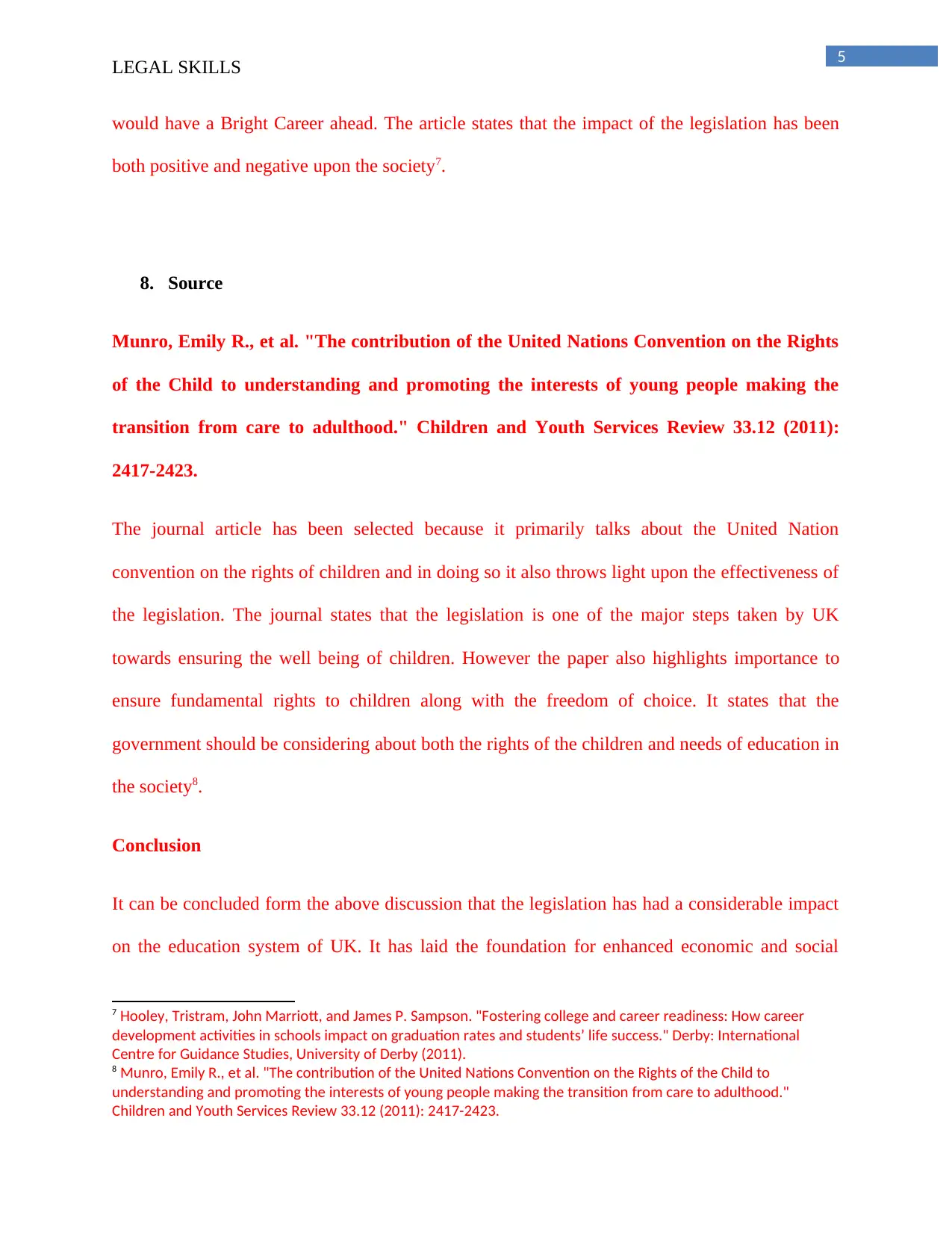
5
LEGAL SKILLS
would have a Bright Career ahead. The article states that the impact of the legislation has been
both positive and negative upon the society7.
8. Source
Munro, Emily R., et al. "The contribution of the United Nations Convention on the Rights
of the Child to understanding and promoting the interests of young people making the
transition from care to adulthood." Children and Youth Services Review 33.12 (2011):
2417-2423.
The journal article has been selected because it primarily talks about the United Nation
convention on the rights of children and in doing so it also throws light upon the effectiveness of
the legislation. The journal states that the legislation is one of the major steps taken by UK
towards ensuring the well being of children. However the paper also highlights importance to
ensure fundamental rights to children along with the freedom of choice. It states that the
government should be considering about both the rights of the children and needs of education in
the society8.
Conclusion
It can be concluded form the above discussion that the legislation has had a considerable impact
on the education system of UK. It has laid the foundation for enhanced economic and social
7 Hooley, Tristram, John Marriott, and James P. Sampson. "Fostering college and career readiness: How career
development activities in schools impact on graduation rates and students’ life success." Derby: International
Centre for Guidance Studies, University of Derby (2011).
8 Munro, Emily R., et al. "The contribution of the United Nations Convention on the Rights of the Child to
understanding and promoting the interests of young people making the transition from care to adulthood."
Children and Youth Services Review 33.12 (2011): 2417-2423.
LEGAL SKILLS
would have a Bright Career ahead. The article states that the impact of the legislation has been
both positive and negative upon the society7.
8. Source
Munro, Emily R., et al. "The contribution of the United Nations Convention on the Rights
of the Child to understanding and promoting the interests of young people making the
transition from care to adulthood." Children and Youth Services Review 33.12 (2011):
2417-2423.
The journal article has been selected because it primarily talks about the United Nation
convention on the rights of children and in doing so it also throws light upon the effectiveness of
the legislation. The journal states that the legislation is one of the major steps taken by UK
towards ensuring the well being of children. However the paper also highlights importance to
ensure fundamental rights to children along with the freedom of choice. It states that the
government should be considering about both the rights of the children and needs of education in
the society8.
Conclusion
It can be concluded form the above discussion that the legislation has had a considerable impact
on the education system of UK. It has laid the foundation for enhanced economic and social
7 Hooley, Tristram, John Marriott, and James P. Sampson. "Fostering college and career readiness: How career
development activities in schools impact on graduation rates and students’ life success." Derby: International
Centre for Guidance Studies, University of Derby (2011).
8 Munro, Emily R., et al. "The contribution of the United Nations Convention on the Rights of the Child to
understanding and promoting the interests of young people making the transition from care to adulthood."
Children and Youth Services Review 33.12 (2011): 2417-2423.
⊘ This is a preview!⊘
Do you want full access?
Subscribe today to unlock all pages.

Trusted by 1+ million students worldwide

6
LEGAL SKILLS
development as the country will be able to produce more skilled workers. However there also
have been arguments that the legislations attempts to compromise right of freedom of choice
from the children by forcing them to be in the education system. Thus the impact of the
legislation has been both positive and negative upon the society.
LEGAL SKILLS
development as the country will be able to produce more skilled workers. However there also
have been arguments that the legislations attempts to compromise right of freedom of choice
from the children by forcing them to be in the education system. Thus the impact of the
legislation has been both positive and negative upon the society.
Paraphrase This Document
Need a fresh take? Get an instant paraphrase of this document with our AI Paraphraser
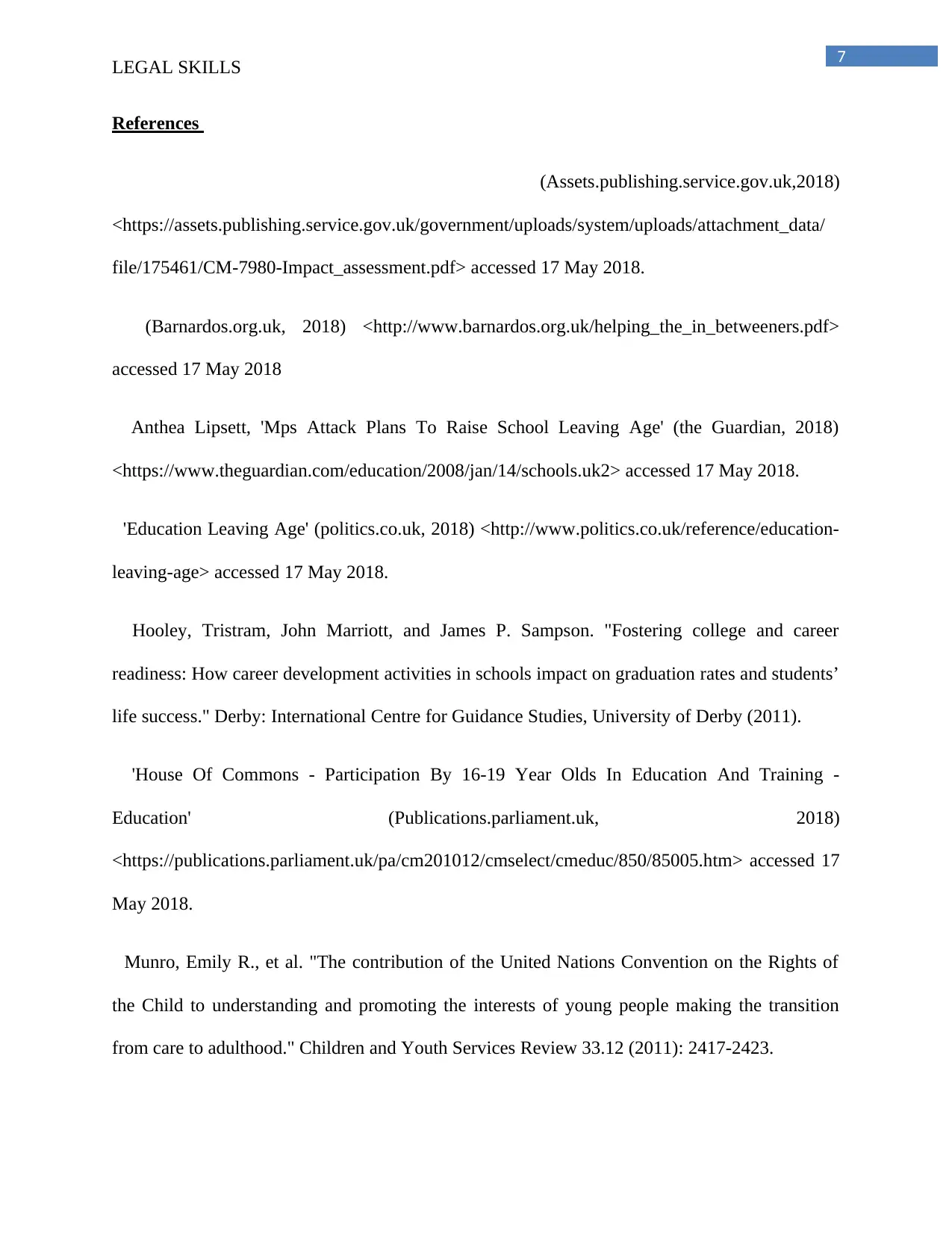
7
LEGAL SKILLS
References
(Assets.publishing.service.gov.uk,2018)
<https://assets.publishing.service.gov.uk/government/uploads/system/uploads/attachment_data/
file/175461/CM-7980-Impact_assessment.pdf> accessed 17 May 2018.
(Barnardos.org.uk, 2018) <http://www.barnardos.org.uk/helping_the_in_betweeners.pdf>
accessed 17 May 2018
Anthea Lipsett, 'Mps Attack Plans To Raise School Leaving Age' (the Guardian, 2018)
<https://www.theguardian.com/education/2008/jan/14/schools.uk2> accessed 17 May 2018.
'Education Leaving Age' (politics.co.uk, 2018) <http://www.politics.co.uk/reference/education-
leaving-age> accessed 17 May 2018.
Hooley, Tristram, John Marriott, and James P. Sampson. "Fostering college and career
readiness: How career development activities in schools impact on graduation rates and students’
life success." Derby: International Centre for Guidance Studies, University of Derby (2011).
'House Of Commons - Participation By 16-19 Year Olds In Education And Training -
Education' (Publications.parliament.uk, 2018)
<https://publications.parliament.uk/pa/cm201012/cmselect/cmeduc/850/85005.htm> accessed 17
May 2018.
Munro, Emily R., et al. "The contribution of the United Nations Convention on the Rights of
the Child to understanding and promoting the interests of young people making the transition
from care to adulthood." Children and Youth Services Review 33.12 (2011): 2417-2423.
LEGAL SKILLS
References
(Assets.publishing.service.gov.uk,2018)
<https://assets.publishing.service.gov.uk/government/uploads/system/uploads/attachment_data/
file/175461/CM-7980-Impact_assessment.pdf> accessed 17 May 2018.
(Barnardos.org.uk, 2018) <http://www.barnardos.org.uk/helping_the_in_betweeners.pdf>
accessed 17 May 2018
Anthea Lipsett, 'Mps Attack Plans To Raise School Leaving Age' (the Guardian, 2018)
<https://www.theguardian.com/education/2008/jan/14/schools.uk2> accessed 17 May 2018.
'Education Leaving Age' (politics.co.uk, 2018) <http://www.politics.co.uk/reference/education-
leaving-age> accessed 17 May 2018.
Hooley, Tristram, John Marriott, and James P. Sampson. "Fostering college and career
readiness: How career development activities in schools impact on graduation rates and students’
life success." Derby: International Centre for Guidance Studies, University of Derby (2011).
'House Of Commons - Participation By 16-19 Year Olds In Education And Training -
Education' (Publications.parliament.uk, 2018)
<https://publications.parliament.uk/pa/cm201012/cmselect/cmeduc/850/85005.htm> accessed 17
May 2018.
Munro, Emily R., et al. "The contribution of the United Nations Convention on the Rights of
the Child to understanding and promoting the interests of young people making the transition
from care to adulthood." Children and Youth Services Review 33.12 (2011): 2417-2423.

8
LEGAL SKILLS
'Raising The Participation Age Means Raising The Bar For Young People' (Teachingtimes.com,
2018) <https://www.teachingtimes.com/articles/rpa-participation-age.htm> accessed 17 May
2018.
LEGAL SKILLS
'Raising The Participation Age Means Raising The Bar For Young People' (Teachingtimes.com,
2018) <https://www.teachingtimes.com/articles/rpa-participation-age.htm> accessed 17 May
2018.
⊘ This is a preview!⊘
Do you want full access?
Subscribe today to unlock all pages.

Trusted by 1+ million students worldwide
1 out of 9
Related Documents
Your All-in-One AI-Powered Toolkit for Academic Success.
+13062052269
info@desklib.com
Available 24*7 on WhatsApp / Email
![[object Object]](/_next/static/media/star-bottom.7253800d.svg)
Unlock your academic potential
Copyright © 2020–2026 A2Z Services. All Rights Reserved. Developed and managed by ZUCOL.




